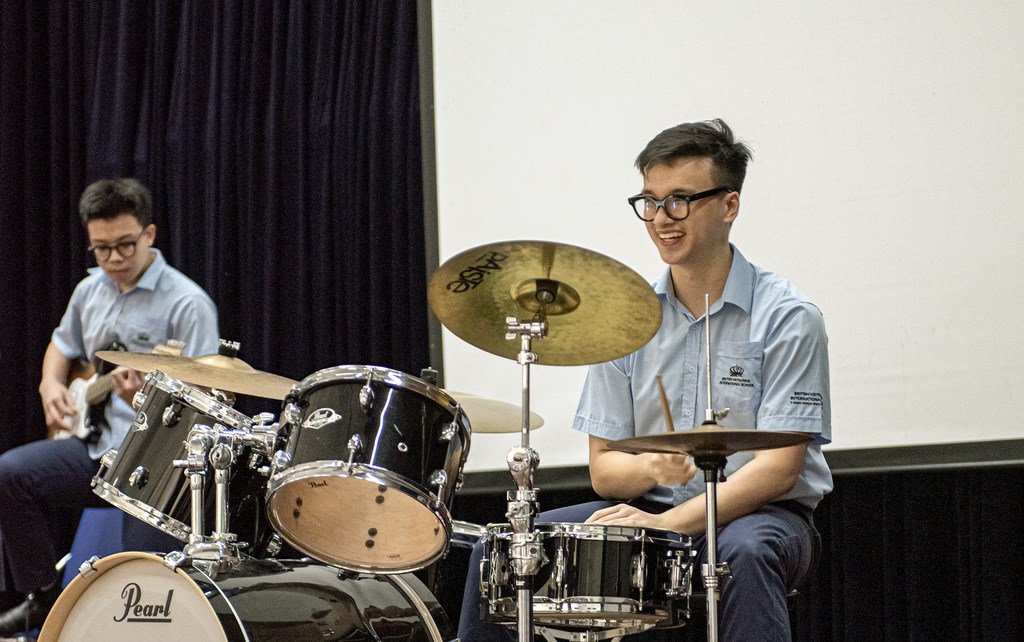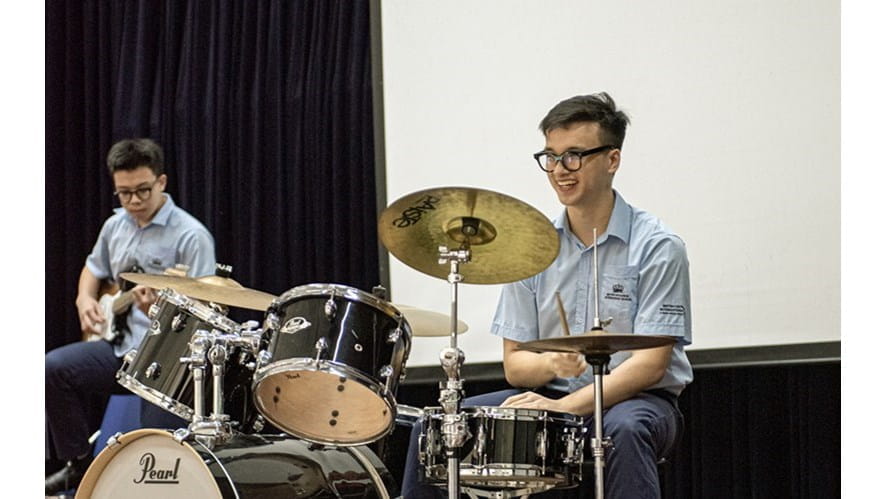The Importance of Music in Education This article outlines the far-reaching benefits of music that stretch way beyond the subject itself and why music is an indispensable part of any academic programme.
Music is arguably the most life-enriching academic subject of them all. A universal language that triggers emotional responses and kickstarts creativity like no other, music is a fundamental pillar of arts education.
This article outlines the far-reaching benefits of music that stretch way beyond the subject itself and why music is an indispensable part of any academic programme.

13 Benefits of Music in Education
Music can bring a series of important benefits to your child’s education, many of which you may not have considered before.
1. Improve language capabilities
Music and language have a deep and profound relationship. The link between musical instruction and better language development in young children has long been established.
Musical training stimulates and trains the same part of the brain that deals with understanding language. Children who have some exposure to musical education will, therefore, have a greater understanding of tone and how different segments of speech align. It can also be incredibly useful if your child is learning a second language.
2. Better cognitive abilities
Playing an instrument increases the use of your neural network. When compared to those who don’t play an instrument, there is some suggestion that musicians have a larger growth of neural activity.
A 2009 study in the New York Academy of Sciences showed how children who received musical instruction showed improved sound discrimination and fine motor tasks, with visible changes in those networks showing during brain imaging.
3. Better maths skills
Children who undertake music in education are also enhancing their maths ability. A link between music and better control of spatial-temporal tasks, as pointed out here in the Journal of Aesthetic Education, means children are better equipped to learn key mathematical skills.
One theory says that learning rhythm is responsible, as maths involves picking up patterns and how visual elements go together.

4. Better test scores
With better maths ability comes the potential for better test scores. A 2007 study from the University of Kansas found that students in primary schools with better musical programmes scored 22% higher in English and 20% higher in maths when compared to those in weaker musical programmes. This was regardless of the socioeconomic factors between the different schools.
5. Inspire creativity
Music is one of the most creatively stimulating tasks any person can undertake. If you want to spark your child’s creativity, there are few better things you can do than to encourage them to create their own unique music by picking up an instrument or engaging in their music class.
6. Refined hand-eye coordination
Learning an instrument to an elite level is no easy task. It takes considerable hand-eye coordination to learn almost any instrument. Those who master their craft are blessed with a unique skill; it’s something that can be applied to other areas of academia and general life.
Hand-eye coordination is important in many sports, especially bats or racquet sports like tennis or cricket. It can also help elsewhere in education, as writing skills and art require the hands and eyes to work together.
In adulthood, your child will find them relying on their hand-eye coordination to do any number of tasks. Practical things like DIY are easier with good coordination. Allowing your child to improve it with music will benefit them for a lifetime.
7. Better memory
Improved memory is another well-established benefit of music in education. Learning an instrument, the language of music and the notes and lyrics that make up songs all require a flexing of memory.
Music is also one of the easiest things to store in your memory, often to our frustration. Songs get stuck in our heads, sometimes for days; a perfect display of how music can stick in our minds.
8. Encourage teamwork
Music is often considered a solo effort, but it’s unlikely your child will go through their musical education alone. In class or as an extracurricular activity, music is one of the best ways to learn vital life skills like teamwork. Be it in a band or singing group, teamwork is vital to creating good music.

9. Relieve stress
School is such an important time for children and at times it can be stressful – especially during tough examination periods.
Music has become a proven remedy to relieving stress, with research from Stanford University linking this to the beat of music. At 60 beats per minute, music can cause our brain to synchronize and cause alpha brainwaves – which are present when we are relaxed. Over a period of 45 minutes or so, it can help induce sleep too.
After a long day studying, a musical session is an easy way to relieve stress and take your child’s mind off of deadlines and exams.
10. Develop social skills
As an extension of improving teamwork, music is also a great way for your child to meet new people and create lasting friendships. Music is a great way to bring people together. If they decide to take up music as an extracurricular activity, they’ll be bonding with likeminded children who share their passion.
In a time when children are increasingly interested in communicating online and focusing on digital skills, music is a refreshing return to face-to-face contact.
11. Instil perseverance
Speak to anyone who has mastered a musical instrument or played in a successful band; musical excellence is hard to come by. It requires plenty of practice and a willingness to keep going.
To continue to improve and progress requires perseverance. A child understanding they have to work hard to achieve something is incredibly powerful and something they will lean on for the rest of their lives. There are few better ways to instil perseverance than through music.
12. Bring about a sense of achievement
When your child does achieve a musical goal, they get the incredible satisfaction that comes from working hard to attain something. In that sense, music is a great confidence builder. Creating something as expressive and loved as music and seeing audiences on stage or family members at home enjoy it can be an incredibly rewarding experience.
Confidence is one of the most valuable skills a child can have and music is one of the best ways to allow it to flourish in your child.
13. Learn an enviable life skill
How many times have you met an adult who says their biggest regret is not learning a musical instrument as a child? Musical skills they didn’t learn as a child become some of the most sought after in adulthood. Help your child to develop their skills in music from an earlier age and you’ll be giving them a gift that will bring them, and others, joy for the rest of their life.
At Nord Anglia Education, we understand the importance of creative arts like music, harnessing the subject to bring benefits that span our entire academic programme. Find out more about our music curriculum, or head to our schools page to a Nord Anglia Education school near you.






